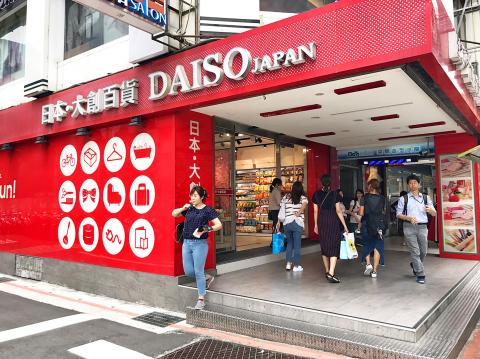Japanese discount store chain Daiso Industries Co has been banned from importing any goods to Taiwan for two years as a penalty for altering transaction dates to obtain an import permit, the Ministry of Economic Affairs said yesterday.
The ministry has revoked the company’s import permit and fined it NT$41.64 million (US$1.39 million) , Bureau of Foreign Trade Deputy Director-General Lee Guann-jyh (李冠志) told the Legislative Yuan in Taipei.
The ministry has also notified the Customs Administration of the ban, as some products imported by the company might have entered the market, he added.

Photo: CNA
Lee’s remarks came after New Power Party Executive Chairman Huang Kuo-chang (黃國昌) last month accused the ministry of turning a blind eye to Daiso, which allegedly imported goods from Japan during a six-month import suspension period in 2015.
The government has tightened the regulations on imports of food and high-risk products from Japan after the Fukushima Dai-ichi nuclear power plant disaster in March 2011.
Daiso was in 2015 prohibited from importing any products into Taiwan after it was found to have illegally import food products from the five Japanese prefectures from which food imports were banned.
The Foreign Trade Act (貿易法) stipulates that companies may import or export goods during a suspension period if the transactions had been established before the punishment was issued, according to.
However, most of Daiso’s goods imported to Taiwan during the suspension period were ordered after the punishment had been imposed, Huang said.
Daiso denied the accusations, but a statement on its Web site said that its management team had made a wrong decision to switch the dates in a bid to obtain approval from the government.
The Japanese budget store chain, which sells more than 20,000 items, operates about 60 stores in Taiwan, company data showed.

‘SWASTICAR’: Tesla CEO Elon Musk’s close association with Donald Trump has prompted opponents to brand him a ‘Nazi’ and resulted in a dramatic drop in sales Demonstrators descended on Tesla Inc dealerships across the US, and in Europe and Canada on Saturday to protest company chief Elon Musk, who has amassed extraordinary power as a top adviser to US President Donald Trump. Waving signs with messages such as “Musk is stealing our money” and “Reclaim our country,” the protests largely took place peacefully following fiery episodes of vandalism on Tesla vehicles, dealerships and other facilities in recent weeks that US officials have denounced as terrorism. Hundreds rallied on Saturday outside the Tesla dealership in Manhattan. Some blasted Musk, the world’s richest man, while others demanded the shuttering of his

ADVERSARIES: The new list includes 11 entities in China and one in Taiwan, which is a local branch of Chinese cloud computing firm Inspur Group The US added dozens of entities to a trade blacklist on Tuesday, the US Department of Commerce said, in part to disrupt Beijing’s artificial intelligence (AI) and advanced computing capabilities. The action affects 80 entities from countries including China, the United Arab Emirates and Iran, with the commerce department citing their “activities contrary to US national security and foreign policy.” Those added to the “entity list” are restricted from obtaining US items and technologies without government authorization. “We will not allow adversaries to exploit American technology to bolster their own militaries and threaten American lives,” US Secretary of Commerce Howard Lutnick said. The entities

Minister of Finance Chuang Tsui-yun (莊翠雲) yesterday told lawmakers that she “would not speculate,” but a “response plan” has been prepared in case Taiwan is targeted by US President Donald Trump’s reciprocal tariffs, which are to be announced on Wednesday next week. The Trump administration, including US Secretary of the Treasury Scott Bessent, has said that much of the proposed reciprocal tariffs would focus on the 15 countries that have the highest trade surpluses with the US. Bessent has referred to those countries as the “dirty 15,” but has not named them. Last year, Taiwan’s US$73.9 billion trade surplus with the US

Prices of gasoline and diesel products at domestic gas stations are to fall NT$0.2 and NT$0.1 per liter respectively this week, even though international crude oil prices rose last week, CPC Corp, Taiwan (台灣中油) and Formosa Petrochemical Corp (台塑石化) said yesterday. International crude oil prices continued rising last week, as the US Energy Information Administration reported a larger-than-expected drop in US commercial crude oil inventories, CPC said in a statement. Based on the company’s floating oil price formula, the cost of crude oil rose 2.38 percent last week from a week earlier, it said. News that US President Donald Trump plans a “secondary